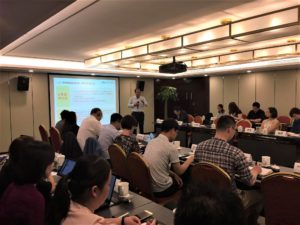
In China, the automotive industry provides millions of jobs. But in the new era of green growth, the focus now lies on social and environmental responsibility, rather than job creation. Cleaning up China’s supply chains will take close collaboration between the automotive companies and their 25.000-part producers. To meet this objective, Drive Sustainability’s local network in China held its first sector exchange meeting to discuss how to explore opportunities for multi-sector collaboration.
“Automotive companies, both national and international, have a major role to play in building a cleaner transportation system in China” urged Dr. Xia Guang from the Ministry of Environmental Protection’s Centre for Environmental Education and Communication. The government encourages voluntary industry action on environmental protection, but it also pursues strict law enforcement, requiring the whole value chain to reduce, monitor and report pollutants. “Some suppliers face closure, if they do not comply environmental regulations. To avoid gaps in supply, due to shutdowns, automotive companies need to collaborate. They need to work closely with their suppliers on compliance and emission monitoring.”
CLOSE COLLABORATION
The Chinese automotive industry leads the development of 11 industry sectors and provides 4 million direct jobs and 13 million indirect jobs. Thus, cleaning up China’s supply chains and transforming the transportation system will take close collaboration between the automotive and related sectors. In recognition of this, Drive Sustainability’s local network in China held its first sector exchange meeting to discuss how to explore opportunities for multi-sector collaboration. Taking place in Beijing, it was attended by industry associations in the metals, minerals, chemical, electronics and automotive sectors, the Ministry of Environmental Protection, as well as NGOs and international organisations, exchanging on sectorial approaches and best practices for the promotion of sustainability in China. Reflecting on the meeting, Stefan Crets, Executive Director of CSR Europe stated “The expectations and requirements towards the automotive and other supply chains are only increasing. The approach forward will be to engage the entire value chain, this will require greater cross-sectorial collaboration and alignment. We saw a lot of opportunity today.”
AUTOMOTIVE INDUSTRY TAKES RESPONSIBILITY
“In China’s new economic era, the automotive industry has a new social responsibility” says Ye Shengji, Deputy Secretary General of the China Association of Automobile Manufacturers (CAAM). In the next 10 years, he predicts that “the priorities of the sector will shift towards energy conservation and roll-out of electric vehicles, smart – and driverless cars, protection of the environment and meeting the people’s demand for a better life.” Key challenges in achieving these priorities are a lack of awareness and investments in new technologies, such as real-time automatic emission monitoring at the sub-tier supplier level. Much of China’s automotive supply chain is highly fragmented and deep layered, consisting of small companies often producing only a component of a part. Automotive companies should take on a “big brother” role, Shengji suggests, working closely with their component manufacturers to build capacity. CAAM has been publishing an annual automotive industry CSR report since 2017.
ADDRESSING RISKS UPSTREAM
“We focus on the upstream of the automotive value chain, where the risk on social and environmental violations is the highest” explains Sun Lihui, Director of Development at the China Chamber of Commerce of Minerals & Chemical Importers & Exporters (CCCMC). They recently established the Responsible Cobalt Initiative (RCI), totalling 32 members covering the entire supply chain. This inclusive initiative focuses on how to identify and advert risks in the Cobalt* supply chain. Moreover, CCCMC launched the first standard for the development of natural rubber and a Sustainable Nature Rubber Platform Initiative.
STANDARDIZATION AND REPORTING
Xiong Huajun, Deputy Secretary-General of the Chinese Electronics and Standardization Association (CESA), raised the topic of standardisation and reporting. However, while encouraging standardization, he also emphasised the importance of localisation. The CESA CSR Guideline takes account of the particular context of the Chinese electronics industry, prioritising accountability, the role of CSR in supply chain management and stakeholder engagement. To further encourage CSR awareness and knowledge sharing, CESA established a self-announcement platform on which companies can publish their CSR reports. To date, more than 50 companies have uploaded their reports.
The meeting was hosted by Drive Sustainability’s local network in China and facilitated by GoldenBee CSR Consulting in collaboration with CSR Europe.
*Cobalt is a key mineral needed for electric vehicle batteries and frequently linked to violent conflict in the Democratic Republic of Congo from which most Cobalt is sourced.
GoldenBee CSR Consulting, founded in 2003, is one of the first professional organizations to embrace social responsibility and sustainable development in China. As an advocate, communicator, promoter and pioneer of social responsibility in China, GoldenBee CSR Consulting takes the lead in researching, consulting, training and responsible brand building services; Based on rich practical and research experience, GoldenBee CSR Consulting proposes and advocates “Responsibility Competitiveness” philosophy, continuously provides high quality CSR consulting services to clients, develops innovative management patterns together with clients to help them transform into sustainable enterprises meeting future challenges. GoldenBee facilitates the Drive Sustainability local network in China.
Drive Sustainability is an Automotive Partnership between BMW group, Daimler AG, Ford, Honda, Jaguar Land Rover, Scania CV AB, Toyota Motor Europe, Volkswagen Group, Volvo Cars and Volvo Group. The partnership, facilitated by CSR Europe, aims to drive sustainability throughout the automotive supply chain by promoting a common approach within the industry and by integrating sustainability in the overall procurement process.

